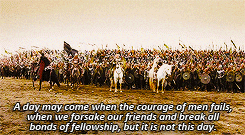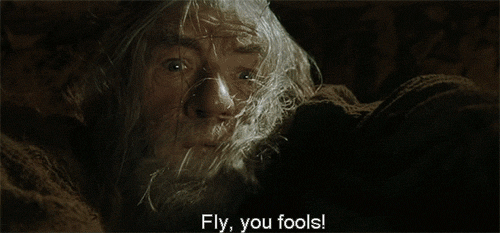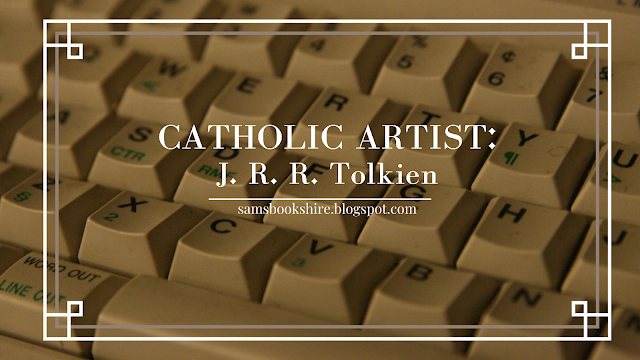(Y'see, I love Tolkien, he also has incredible depth to his work, and he was fairly prolific, so...trying to talk about his Catholicity in one post seems like an overwhelming task. Especially since many smart people have written entire books on the topic. But I'm going to do my best. What would a series on Catholic artists be without Tolkien?) (I told a friend of mine that I was struggling to feel like I was doing this post justice, and he suggested I just write a book on the topic and ask y'all to buy it. Not a bad idea. I'd probably have enough material.)
(One other note before we start: throughout this post series, I'm going to talk a lot about Catholic belief and thought. This doesn't mean no other Christian groups believe the things Catholics believe or think, but I'm not familiar with what every other Christian group believes. For all I know, they might believe some of the things I'm talking about, too.)
I thought I'd tend to start these posts with a list of the author/artist's (fiction) works I've read, and another list of other works which I haven't read, so that you can get an idea of what I'm basing my analysis/opinions/&c on. In this case, I'm also adding a list of other blog posts I've written about him, since there are several.
What I've Read:
The Lord of the Rings (The Fellowship of the Ring, The Two Towers, The Return of the King)
The Hobbit
Farmer Giles of Ham
The Adventures of Tom Bombadil
"Leaf by Niggle"
Smith of Wootton Major
The Silmarillion
Unfinished Tales
Mr. Bliss
Roverandom
What Else Tolkien Wrote:
The Father Christmas Letters
(A series of 12 books collected by Christopher Tolkien, containing the fragments "left over" after LOTR, The Silmarillion, and Unfinished Tales. Of these, I've only read snippets.)
What Other Posts I've Written About His Work:
A Tolkien Blog Party: Christ Figures in Lord of the Rings
Tolkien's True Myth & Tropes In Fiction
Samwise Gamgee, the Chestertonian Everyman, and Mysticism
Kairos in The Lord of the Rings
The Issue of Purgatory: Leaf by Niggle vs. The Great Divorce
One of the most oft-quoted lines by Tolkien, at least in the circles which I frequent, is "The Lord of the Rings is of course a fundamentally religious and Catholic work; unconsciously so at first, but consciously in the revision."
To a certain extent, this is a facepalm moment. Tolkien, my dear man, of course LOTR ended up being a fundamentally religious and Catholic work. You're a devout Catholic, with a thoroughly Catholic imagination, baptized by reading things like George MacDonald, Chesterton, fairy tales, &c. And all of your other works have echoes of that Catholic imagination, too. Obviously your works, coming, as they do, through you, will be Catholic.
But also, to someone unfamiliar with the Catholic or even just the Christian tradition, the fundamental religion and Catholicity of the work is perhaps not so obvious. It was even not all that obvious to me when I first read it. (Although, I think to some extent that might be because I am steeped enough in the Catholic/Christian tradition that when something is very consonant with it, I don't always notice, whereas when something is dissonant with it, it's very obvious to me. This does, notably, make this post series a bit hard to write. XD) As I got older and read more of his work, including his collected letters, which are amazing (although I will always be mad at Stupid Humphrey Carpenter [yes, that is his Homeric epithet] about how few letters he included), the Catholic resonances became more obvious.
(Joseph Pearce's books, Bilbo's Journey and Frodo's Journey, both very short, but excellent nonetheless, also helped. There's a certain amount of Pearce's thought that's made its way into this post. There. Debt acknowledged.)
Tolkien is also interesting in that alone among the artists who I'm planning on writing about, as far as I know, none of the characters in any of his works is, strictly speaking, Catholic, even a bad Catholic. (One could argue that Niggle in "Leaf by Niggle" is an exception, but since that's an allegory, and religion one way or another is not stated in the work, I'm going to say it doesn't count.) Tolkien solidly lives in the realm of fantasy, and thus relies on the truth, beauty, and goodness that I talked about in my initial post in this series to make his works Catholic.
And now I'm stalling, because I'm having a hard time figuring out what to start talking about, so I'm just going to dive into some bullet points about ways in which Tolkien conveys Catholicity in his work. (This is harder than it sounds, let's just be clear. XD)
(Lastly: the irony of using LOTR movie gifs when I'm only discussing the books (+ a bit about The Hobbit and The Silmarillion) does not escape me, but without them, the post looked really boring, so here we are.)

And yet.
And yet, while the darkness he conjures with his words obscures the world, it's not all there is.
“There, peeping among the cloud-wrack above a dark tor high up in the mountains, Sam saw a white star twinkle for a while. The beauty of it smote his heart, as he looked up out of the forsaken land, and hope returned to him. For like a shaft, clear and cold, the thought pierced him that in the end the Shadow was only a small and passing thing: there was light and high beauty for ever beyond its reach.” --The Return of the King
“Suddenly, caught by the level beams, Frodo saw the old king’s head: it was lying rolled away by the roadside. ‘Look, Sam!’ he cried, startled into speech. ‘Look! The king has got a crown again!’ The eyes were hollow and the carven beard was broken, but about the high stern forehead there was a coronal of silver and gold. A trailing plant with flowers like small white stars had bound itself across the brows as if in reverence for the fallen king, and in the crevices of his stony hair yellow stonecrop gleamed. ‘They cannot conquer for ever!’ said Frodo.” --The Two Towers
Even amidst the gloom, there is hope, and things higher and further above the darkness. And the darkness doesn't win. At least, it does not win all of the battles, and it certainly does not win the war, which is an extremely Catholic point of view. We do believe that the devil is the villain in history, and that the world is in gloom under his dominion, the dominion of Death, which, on the other hand, has been completely taken away by Christ.
"Death is swallowed up in victory. O death, where is thy victory? O death, where is thy sting?" --Corinthians 15:55
Even if we can't see the vanquishing of death in this world yet, because this world is still broken and fallen and all of that, it has been accomplished. Which Tolkien also does a good job of portraying.

"We are not contending against flesh and blood, but against the principalities, against the powers, against the world rulers of this present darkness, against the spiritual hosts of wickedness." --Ephesians 6:12
And Tolkien portrays this in his work, too. As I noted above, the villains of various works are not simply bad people, but literally the devil and his fallen angels. Various characters, such as Beren & Luthien (more on her in a moment) and Isildur physically go up against Morgoth and Sauron, and other characters, like Sam and Frodo, go up against them by either fighting their armies or destroying things important to them.

"I do not expect ‘history’ to be anything but a ‘long defeat’— though it contains (and in legend may contain more clearly and movingly) some samples or glimpses of final victory" --Letter 225
If one reads The Silmarillion, after every victory, things go downhill. In fact, even after LOTR, Tolkien started writing a story in which Aragorn's heirs dropped the ball and the darkness had spread again. (Am I the only one who's glad that never got published? 😅 Because I really am glad.)
As I said above, the world is currently under the domain of Death & the devil, although Christ's victory has opened the gates of Heaven and ultimately unseated the devil. But even so, history is a story of the devil winning battle after battle (though losing some) but God ultimately winning the war, through the Resurrection of Christ.
So that's probably part of why Tolkien wrote Middle-Earth's history the way he did.
But ALSO, I think Tolkien knew a lot about human nature, being a sensitive and fairy-tale-loving and Catholic man and all that.
And the truth about humans and history is that, even after the eucatastrophe of Christ's life, this literally always happens. Things get better, awesome even for a bit, and then they get worse.
Because we mess up. Again.
For example (and I know this is pre-Christ, but we're starting there, hold on), in the Old Testament, the period of the Judges? The Israelites fall away from God, they get attacked, they go "oh no, maybe we shouldn't have abandoned God, oops" and call out for help, God sends them a judge who gets them out of their problems (e.g., Gideon, Sampson, Deborah, and, my personal favorite, Ehud, who defeated his enemy because he was a lefty. As am I. :P), and then as soon as life gets good again, they fall away from God again.
My brain is a little dead from how busy my September has been, but one easy example that springs to mind from the centuries AD (and which Tolkien definitely would have known) is Charlemagne's reign and the decline after him.
So, anyway. Tolkien writes this way because a) it's realistic, and b) it's a Catholic view. (Not the only Catholic view. But one possible Catholic view.)

They're so fun to spot, guys, and to think about how each one reflects a different aspect of Christ and how it's showcased in the character. For instance, Gandalf represents Christ's priestliness. He's the one who faces off with evil and offers a sacrifice--himself--and then rises. Whereas Aragorn represents Christ's kingliness. "The hands of the king are the hands of a healer." (Side note: I get a tiny lump in my throat every time I read or write that sentence out. Tolkien really has a way with words.) Whereas Frodo represents His carrying of our sin unto the bitter end. And I could go on for much longer, and in fact, did do so--thus, I will direct you to the post. (Which I also linked right there, because I need to stop being lazy.)

An example of allusion: "Down snake...down on your belly!" (Two Towers) versus "to the serpent...upon your belly you shall go" (Genesis)
An example of similarity of writing: There's a section of Unfinished Tales which is the chronicles of the Kings of Numenor, which sounds a whole dang lot like the books of 1 & 2 Kings as well as 1 & 2 Chronicles.
"He was born in the year 1634, and ruled for 160 years; he surrendered the sceptre in 2029, an died in 2035. He was a mighty King, but greedy of wealth." --Unfinished Tales
"And the time that Jeroboam reigned was twenty-two years; and he slept with his fathers, and Nadab his son reigned in his stead." --1 Kings 14
"[H]e was like his father proud and greedy of wealth, and the Numenoreans in his service exacted heavy tribute from the men of the coasts of Middle-Earth." --Unfinished Tales
"And he walked in all the sins which his father did before him; and his heart was not fully true to the LORD his God" --1 Kings 15
"Tar-Palantir repented of the ways of the Kings before him, and would fain have returned to the friendship of the Eldar" --Unfinished Tales
"He was twenty-five years old when he began to reign, and he reigned twenty-nine years in Jerusalem...he did what was right in the eyes of the LORD...removed the high places, and broke the pillars, and cut down the Asherah...he held fast to the LORD; he did not depart from following him." --2 Kings 18
And it's awesome. For instance (this is hard to express, and I couldn't find the exact quotes I wanted to illustrate it, but I hope these ones help):
"seeing in a flare of lightning the body as it seemed of a slain maiden lying upon the mound of Finduilas he was stricken to the heart. But the woodmen lifted her up, and Turambar cast his cloak about her, and they took her to a lodge nearby." --The Silmarillion
"he came upon Luthien...all memory of his pain departed from him, and he fell into an enchantment; for Luthien was the most beautiful of all of the Children of Iluvatar." --The Silmarillion
"queenly she looked, and thought and knowledge were in her glance, as of one who has known many things that the years bring. Above her brow her head was covered with a cap of silver lace netted with small gems, glittering white; but her soft grey raiment had no ornament save a girdle of leaves wrought in silver. " --The Fellowship of the Ring
And many of them are awesome, too. For example:
"Then Sauron sprang upon Luthien; and she swooned...but even as he came, falling she cast a fold of her dark cloak before his eyes; and he stumbled" --The Silmarillion
"she did not blench: maiden of the Rohirrim, child of kings, slender but as a steel-blade, fair yet terrible. A swift stroke she dealt, skilled and deadly. The outstretched neck she clove asunder, and the hewn head fell like a stone." --The Return of the King
"Then tottering, struggling up, with her last strength she drove her sword between crown and mantle...the sword broke sparkling into many shards. The crown rolled away with a clang." --The Return of the King
This feminine awesomeness is also a very Catholic thing, just like the chivalry. The most awesome human in Catholic tradition (excluding Jesus, Who in addition to being fully human is also fully God) is the Virgin Mary, who, while being a woman with feminine mystery, worthy of chivalry, also is portrayed crushing the head of Satan in our iconography on a regular basis. Hence, Tolkien writing characters like Eowyn and Luthien, who go head-to-head with evil, is not at odds with Catholic tradition of reverence for womanhood, but actually incredibly in sync with that tradition. (Perhaps one could say that Catholics do also believe that women are kick-butt awesome, just in a slightly different way than popular culture?)

"But all that came out with a sudden squeal was: 'Time! Time!' Bilbo was saved by pure luck. For that of course was the answer." --The Hobbit
This seems to break all of the storytelling rules--aren't we always told not to get characters out of trouble in a deus ex machina sort of way? But I think this works for Tolkien for two reasons. One, that he doesn't keep his characters out of all trouble. They have problems. The world is dark, as we've noted. They're not swanning through life without a care in the world. Gollum still wants to eat Bilbo after he answers the riddle. But sometimes, the worst is averted, even just for a time. And two, that Deus (note the capital) ex machina doesn't bother him. God, or rather Iluvatar, the All-Father (aka God) exists in Middle-Earth. And His providence is often seen, by those characters down "in the trenches" as a kind of luck. Bilbo thinks that when he finds the Ring, it's simple luck. Yet, Gandalf notes in Fellowship:
"There are other forces at work in this world, Frodo, besides that of evil. Bilbo was meant to find the Ring, in which case you were also meant to have it. And that is an encouraging thought."
This quote heavily implies a divine providence on Iluvatar's part. Not to keep the characters completely out of trouble, with no suffering in their lives, &c, but to guide their steps for good and not, ultimately for evil.
"For I know the plans I have for you, says the LORD, plans for welfare and not for evil, to give you a future and a hope." --Jeremiah 29:11
Then there's Eucatastrophe, which Tolkien speaks of thusly:
"[T]he 'consolation' of fairy-tales has another aspect than the imaginative satisfaction of ancient desires. Far more important is the Consolation of the Happy Ending. Almost I would venture to assert that all complete fairy-stories must have it. At least I would say that Tragedy is the true form of Drama, its highest function; but the opposite is true of Fairy-story. Since we do not appear to possess a word that expresses this opposite — I will call it Eucatastrophe. The eucatastrophic tale is the true form of fairy-tale, and its highest function.
The consolation of fairy-stories, the joy of the happy ending: or more correctly of the good catastrophe, the sudden joyous “turn” (for there is no true end to any fairy-tale): this joy, which is one of the things which fairy-stories can produce supremely well, is not essentially 'escapist', nor 'fugitive'." --On Fairy Stories
This whole "eucatastrophe" thing might also seem like a way of getting characters out of trouble. A sudden turn of a story for good! Often (but not always) without the characters' agency! Everyone who has written a book on writing rolls over in their grave!
But again, this reflects a view of the world in which the history of the world has had its own eucatastrophe in the coming of Christ. It was an unexpected turning for good which was unmerited, unprompted by human agency, and fully and completely a grace from God. So, Tolkien's use of eucatastrophe in his own work reflects, thus, his Catholic view of history, and the intervention of God's providence within it.
Whew! That was a lot! Not, perhaps, as much as I could write on Tolkien as a Catholic author (maybe I will write that book someday...I would highly enjoy it, and there's a gap in the scholarship, I think...), and after all, writing this post sparked the idea for another on Tolkien's writing. But that seems like a reasonable amount for a single blog post! Seven is a good number of bullet points. (Oh, and also: you may have noticed that I didn't mention lembas even once. That was on purpose. Lembas has been talked about plenty, I think, and I wanted to draw attention to more overarching topics. Come at me in the comments. XD)
Happy Tolkien Blog Week everyone--I can't wait to see your posts!!
What is your favorite of Tolkien's works? Least favorite? Have you ever thought about the Catholic and Christian resonances in his work? Who's your favorite of his female characters?

Sam, you must go write a post about women in Tolkien's fiction! Please. PLEASE. I didn't know that I needed this until just now, but I do.
ReplyDeleteI really like your point about the eucatastrophe/luck. Although I hadn't really thought about it before, Tolkien's use of luck would seem strange unless put in the context of God's providence. It makes me want to add eucatastrophe to my own books as well.
Actually, though, I've noticed that sudden, abrupt turn of events for good happens in a lot of books not written by specifically Catholic authors. In Harry Potter 7, Harry semi-miraculously survives being murdered. In The Thief, Eugenides (the god) grants supernatural silence to Gen. Not to mention the numbers of books where a character is about to be captured/executed/insert-bad-thing-here until some unforeseen turn of events suddenly rescues him. It makes me wonder--is the eucatastrophe a part of our cultural/human identity? Does some part of our humanity unconsciously expect that good will win--even if at the very last minute?
(That got a lot more philosophical than I expected, good luck replying to this XD)
Okay, I will! (It'll probably not be until after Winter Break, though. I don't have the headspace right now, lol.)
DeleteThank you! I'm happy that was eye-opening...it's something that I hadn't really noticed until recently, when Joseph Pierce halfway pointed it out.
You're so right, it's not something unique to Catholic books--I didn't even think about that! There are so many examples of authors 'breaking the rules' about getting their characters out of trouble in a deus ex machina manner in a REALLY effective way. I think one needs to have a *reason* (both in terms of plot and some sort of higher power) to break the rule, but done well, like in your examples, it adds something to the book. Because I think that maybe our humanity does expect something to intervene at the last minute for good to win. Iiiiiiiiinteresting, I hadn't even thought of that!
(As you can see, I enjoy responding to philosophical comments. ;))
Definitely write that post on Tolkien and women. I'd love your take especially Eowyn (I'd like to compare notes with my own post on her, lol).
ReplyDeleteAlrighty! I'm planning on it, and I'll make sure to give my thoughts on Eowyn...and I'll need to read your post on her at some point, too!
DeleteSo much good stuff here! I'm Lutheran, not Catholic, but we share 90% of the same theological ideas and traditions, and yeah, Tolkien's understanding of Jesus as Prophet, Priest, and King and the way he weaves that into LOTR adds so much depth and richness. The first time I read someone pointing out how he does that, it kind of blew my mind. I couldn't believe I hadn't seen that, but I realized I had felt it anyway.
ReplyDeleteDefinitely write a post about the women in Tolkien!!!
Thank you! Tolkien's use of Priest, Prophet, and King really does add so much, even subconsciously, especially for people raised in that tradition.
DeleteWill do! (But it might be a bit, because...school. XD)
I had never thought of the Frodo/Christ parallel before! That's so cool! I had noticed the others, but somehow that one escaped me.
ReplyDeleteThis whole post was really awesome. I would definitely buy a book on these topics should you ever decide to write one.
Thanks for sharing your thoughts!
Ugh... once again it defaulted me to "anonymous." I don't know why blogger and wordpress hate me so much so suddenly. I'm gonna blame my browser.
DeleteWell, I'm happy I could be the one to introduce you to it! It's such a beautiful one, in my opinion.
DeleteAww, thank you! I'll definitely keep that in mind, should I decide that nonfictional literary & historical analysis is my niche. ;)
You are most welcome!
ACH SAM I LOVE THIS POST A LOT.
ReplyDeleteJust really...really really good stuff. I wish I was more coherent tonight. It's really hard to explain why exactly I loved certain parts so I'm just going to fling stuff at the wall and see if it sticks...(is that even an expression.)
THE LONG DEFEAT THING. The Silmarillion finally makes some sense to me???!!! I never thought of it that way and I just thought it was depressing. Now I want to reread it and I definitely don't have time for that. *rolls eyes, smirking at self, and tossing it onto the preeminent TBR*
Also. I hadn't really paid much attention, but I think I had subconsciously noticed in past readings that Tolkien's vernacular has a Biblical flavor, but I don't think I realized just how biblical. I am not upset about that. Biblical style is pretty neat in and of itself and I think it's another thing that gives Tolkien's works a unique flavour of Western Christendom, now that I come to contemplate it.
Ahhh I love and have loved for years the way Tolkien portrays women. Coolest, Catholicest thing ever. It reminds me quite a lot of my absolute favorite Catholic book on femininity (The Privilege of Being a Woman, by Alice Von Hildebrand) and I'm not complaining about that because that book is awesome. Also, please write a whole post on the topic. I would eat it up with a spork. (<what is this comment.)
Also...I had never heard the word eucatastrophe before today and I like it quite a lot. So thanks for that.
God bless you dear Sam! Wonderful post as always! Good luck with all your busyness!
Grim, thank you so much! Your comment made my day!
Delete(I...think that's an expression? But I think it's a spaghetti thing? I really don't know. XD)
Ahhh I'm SO HAPPY I could make The Silmarillion make some sense to you! Because I LOVE IT, and making you want to reread it and start not thinking it's depressing is definitely a huge win. (But I apologize to your TBR. Heh.)
I'd subconsciously noticed it, too, but it wasn't until really recently that I started to realize just /how/ biblical and rich his prose is. It's really insane. (And it really does link his legendarium to Western Christendom, I hadn't thought of that, but I love it!)
It really is the coolest, Catholicest thing ever! Maybe I need to read The Privilege of Being a Woman all the way through again...I've read parts of it in the past, but really remember nothing. XD I shall certainly write a post on it for your spork-eating pleasure! (But not just yet, because school, lol.)
You're most welcome! It's a good word. :)
Thank you so much! God bless you, too, Grim!
Tolkien: *took like, thirteen years to write a single novel*
ReplyDeleteAlso Tolkien: *major work that he started when he was 20 didn't get published till after his death*
Sam: Tolkien was fairly prolific--
So that amused me.
Bless you for writing this, though. It was great. I think periodically about writing something about what all Tolkien and his work means to me, but I give up the idea every time, because the idea of even trying to do him justice is simply overwhelming. You're a braver woman than I.
Ahhhh, the long defeat. That is such an important idea to me, and I love the way Tolkien portrays it in his work so much? I don't actually know how to explain how much. Everything ties into it. The fading of the Elves, the loss of Numenor, the dying out of the Ents, etc.
Yeah I have no brain for this comment but I liked this post a lot. And I always thought of eucatastrophe not as deus ex machina but as...the kind of plot twist that's both shocking (because it's unforeseen and it's big) and utterly satisfying (because it was foreshadowed in every line and seems almost inevitable). Like the ending of Tangled doesn't feel like a cheat at all, even though it's so purely (and surprisingly) eucatastrophic. Or even, y'know, the ending of LOTR itself. Yeah. I love eucatastrophe
Lol, I did not think of that! But hey, he produced a TON of stuff on the side, so I think my point about his prolificness still stands. (*cough* twelve volumes of extras published by Christopher *cough cough*)
DeleteThank you! I don't feel like I did him justice here at all, but I wanted to at least try and get SOMEthing out. So, I appreciate you saying it was great. :)
Oh wow, I hadn't ever thought about /how/ prevalent that is! All of those examples! So true!
That's truuuuuue!! An unforeseen plot twist that's inevitable-ish...yes! (As you can see, I have no brain for this comment either, lol. Please excuse. XD) Excellent point about Tangled, too. I've definitely met people who think it's cheating, but I don't...though I'd never thought to apply the term eucatastrophe to it, but it fits perfectly.